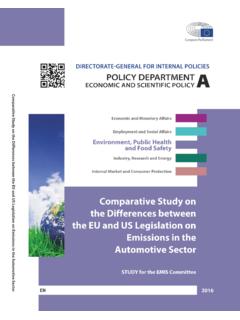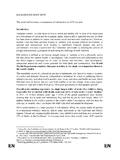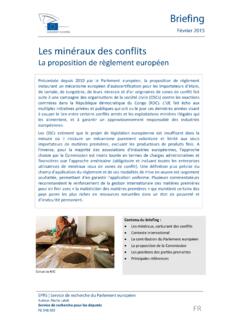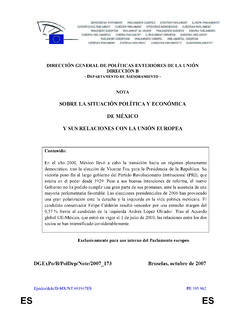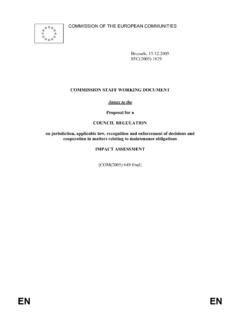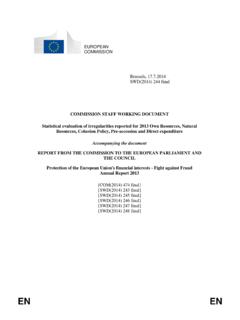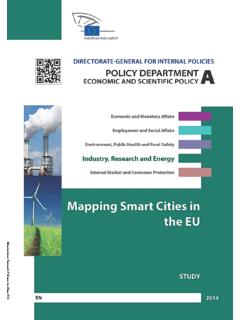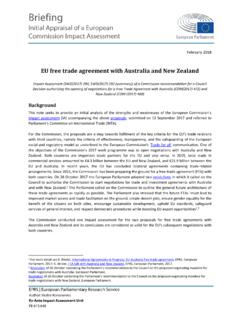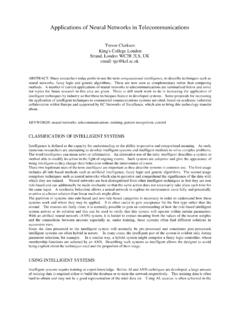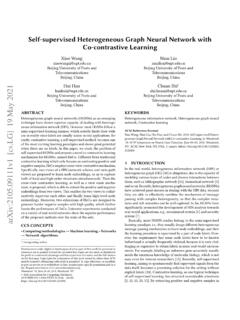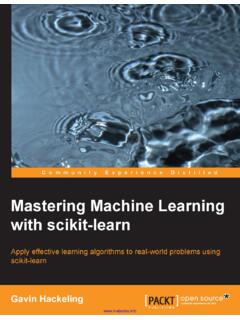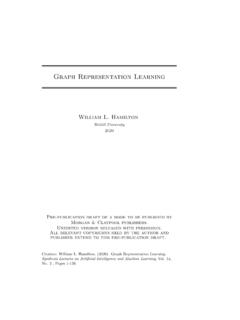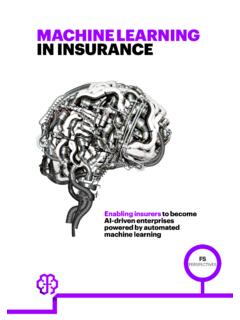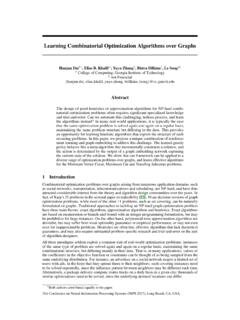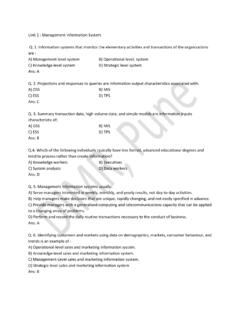Transcription of Economic impacts of artificial intelligence
1 BRIEFING EPRS | European Parliamentary Research Service Author: Marcin Szczepa ski Members' Research Service PE July 2019 EN Economic impacts of artificial intelligence (AI) SUMMARY artificial intelligence plays an increasingly important role in our lives and economy and is already having an impact on our world in many different ways. Worldwide competition to reap its benefits is fierce, and global leaders the US and Asia have emerged on the scene. AI is seen by many as an engine of productivity and Economic growth. It can increase the efficiency with which things are done and vastly improve the decision-making process by analysing large amounts of data. It can also spawn the creation of new products and services, markets and industries, thereby boosting consumer demand and generating new revenue streams.
2 However, AI may also have a highly disruptive effect on the economy and society. Some warn that it could lead to the creation of super firms hubs of wealth and knowledge that could have detrimental effects on the wider economy. It may also widen the gap between developed and developing countries, and boost the need for workers with certain skills while rendering others redundant; this latter trend could have far-reaching consequences for the labour market. Experts also warn of its potential to increase inequality, push down wages and shrink the tax base. While these concerns remain valid, there is no consensus on whether and to what extent the related risks will materialise. They are not a given, and carefully designed policy would be able to foster the development of AI while keeping the negative effects in check.
3 The EU has a potential to improve its standing in global competition and direct AI onto a path that benefits its economy and citizens. In order to achieve this, it first needs to agree a common strategy that would utilise its strengths and enable the pooling of Member States' resources in the most effective way. In this Briefing Context Economic potential of AI Impact of AI on manufacturing Effects of AI on firms, industries and countries AI impacts on labour markets and redistributive effects of AI Selected policy implications of AI EPRS | European Parliamentary Research Service 2 Context artificial intelligence (AI) is a term used to describe machines performing human-like cognitive processes such as learning, understanding, reasoning and interacting.
4 It can take many forms, including technical infrastructure ( algorithms), a part of a (production) process, or an end-user product. AI looks increasingly likely to deeply transform the way in which modern societies live and work. Already today, smartphone smart assistants, such as Siri, perform a variety of tasks for users; furthermore, all Tesla cars are connected and things that any one of them learns are shared across the entire fleet. AI also matches prices and cars when one orders an Uber ride, and curates what social media offer to a user based on their past behaviour. With the rise of AI come the important questions of how much it will affect businesses, consumers and the economy in more general terms. Employees are increasingly interested in knowing what AI means for their job and income, while businesses are also keen to find ways in which they can capitalise on the opportunities presented by this powerful phenomenon.
5 There is a global accord that AI technologies have the potential to revolutionise production and contribute to addressing major global challenges, a view shared by organisations such as the OECD and the European Commission. Rapidly increasing computing power and connectedness have made it possible to compile and share large volumes of valuable data, which is now more accessible than ever before. This has created momentum for AI technologies. Importantly, AI patents have been on the rise worldwide (see Figure 1), with a 6 % average yearly growth rate between 2010 and 2015, which is higher than the annual growth rate observed for other patents. The countries at the forefront of research during this period were Japan, South Korea and the United States, which together accounted for almost two-thirds of AI-related patent applications.
6 South Korea, China and Chinese Taipei have recorded a remarkable increase in the number of AI patents compared to their past results. EU Member States contributed 12 % of the total AI-related inventions over 2010-2015, a decrease from the 19 % recorded in the previous decade. A 2019 report on AI by the World Intellectual Property Organization (WIPO) shows that there has been a boom in the number of scientific papers in the field since the start of the century, followed by an upsurge in patent applications between 2013 and 2016. This could indicate a switch from theoretical research to the practical application of AI technologies in commercial products and Figure 1 AI patents worldwide, 2000-2015 Source: OECD, Science, Technology and Industry Scoreboard, 2017.
7 0 2 4 6 8 10 12 14 16 18 2020002001200220032004200520062007200820 09201020112012201320142015 ThousandsArtificial intelligence (AI) patents-551525%Annual growth010203040 INDGBRCANFRADEUTWNCHNEU28 USAKORJPN%Top economies' shares in AI-related patents2000-052010-15 Economic impacts of artificial intelligence 3 services. The WIPO reckons that the large number of patents in machine learning shows that this is currently the main application field of AI, while deep learning (used, for example, in speech recognition) and neural networks are the fastest-growing technologies. The OECD also attributes recent progress in AI to the development of deep learning using artificial neural networks. The WIPO report reveals that the largest number of AI-related patents is in areas such as telecommunications, transport, life- and medical sciences, and personal devices that compute human computer interaction.
8 Smart cities, agriculture, e-government, banking and finance are the most dynamically growing areas of application. The WIPO report also highlights the dynamic growth in the number of AI patents registered by China, pointing out that since 2014, it has recorded the highest number of first-patent filings. According to the WIPO, China, the US and Japan together account for 78 % of total AI-related-filings, while between 2000 and 2015 almost one in five AI patent families featured a European Some argue that in the AI race, the EU has a structural disadvantage: a lack of scale manifested by a lack of a huge homogenous pool of data, which is an essential precondition for a thriving AI ecosystem. In the EU, the level of AI uptake by companies is low, and AI-related investment and patent numbers are lagging behind the US and Asia.
9 However, the EU has the potential to leverage its high value-added manufacturing and industry base and use its well-qualified workforce to improve its global position. It can also use its regulatory prowess and clout to become a global leader in AI governance, and use tools, such as standards, to its advantage. Some see developed EU countries, particularly northern European ones, as the inevitable winners in the global AI revolution. Taking into account the fierce global competition in AI, the European Commission maintains that a solid coordinated framework is necessary to advance European efforts in this undoubtedly promising sector, an urgency recognised by many EU Member States. It also considers AI one of the most strategic technologies of the 21st century.
10 Economic potential of AI The majority of studies emphasise that AI will have a significant Economic impact. Research launched by consulting company Accenture covering 12 developed economies, which together generate more than % of the world's Economic output, forecasts that by 2035, AI could double annual global Economic growth rates. AI will drive this growth in three important ways. First, it will lead to a strong increase in labour productivity (by up to 40 %) due to innovative technologies enabling more efficient workforce-related time management. Secondly, AI will create a new virtual workforce described as 'intelligent automation' in the report capable of solving problems and self-learning. Third, the economy will also benefit from the diffusion of innovation, which will affect different sectors and create new revenue streams.
